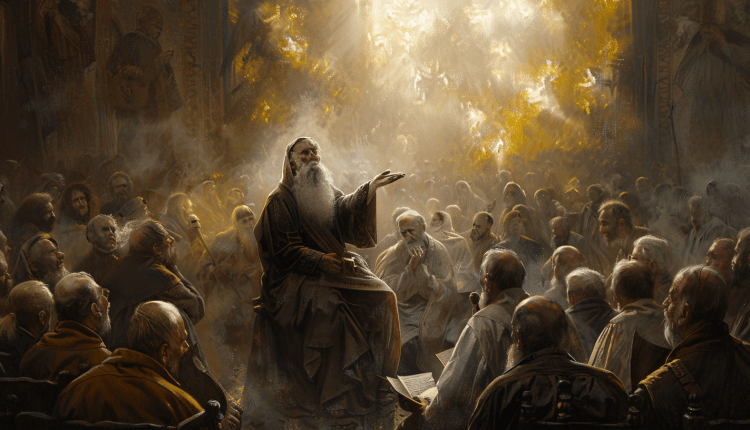Infallibility of Prophets in the Quran
Can reasons or evidences for the infallibility of prophets be found in the Quran? This article discusses the most important reasons for the divine prophets’ infallibility as indicated in the Quran.
Meaning of Infallibility
“Infallibility” linguistically means to keep back and protect, and technically, it’s a divine grace to special servants allowing them, by their own choice, to abstain from despicable acts. The concept of prophets being immune to sin and error is broadly accepted among all Muslims and even among the followers of other religions and nations, although there are differences in their types and characteristics.
Infallibility has levels that can be categorized into four: 1. Infallibility in beliefs, 2. Infallibility in preaching, 3. Infallibility in stating laws, and 4. Infallibility in everyday actions and affairs.[1]
Reasons for the Prophets’ Infallibility in the Quran
Verses indicating the prophets’ infallibility can be studied in three main categories:
First Category of Verses:
Verses that directly indicate the infallibility of the prophets, denying their disobedience and even errors and mistakes, can be considered direct textual evidence of their infallibility.
1- Verses that introduce the character of the prophets to us, making it clear that the prophets are God’s chosen and sincere servants, whom God has placed as true examples and models among people.
For example, the verse: “Say, ‘Praise be to Allah, and peace on His servants whom He has chosen. Is Allah better, or what they associate [with Him]?’”[2] This category of noble verses explicitly states that the prophets never commit divine disobedience or perform despicable deeds because a divine choice is based on merits and is not without standards.
2- Verses containing the word “خلص” (pure) and its derivatives, for instance, regarding Prophet Joseph, it says: “Indeed, he was of Our sincere servants.”[3] These noble verses, by introducing prophets as sincere, imply that they are free from all pollution and sin, hence providing evidence of their infallibility.
3- Verses that introduce the prophets as real examples and models.
One such verse is: “Indeed, in the Messenger of Allah, you have a good example for whoever hopes in Allah and the Last Day and remembers Allah much.”[4] Being a model requires qualification, and not only do the prophets have the qualification to be models, but God Himself has presented them as real examples and models. The idea that such a person could commit disobedience is far-fetched and irrational.
Second Category of Verses:
Verses that express the relationship between the prophets and the people.
1- Some of these verses specify that the relationship between people and prophets is not one of equality, but one of leader and follower, and obedience to them is mandatory for all humans, for example: “And obey Allah and the Messenger that you may obtain mercy.”[5] And “Indeed, your Lord is the Most Merciful, so follow me and obey my command”[6]
2- A set of verses indicates that those who obey the prophets and follow them completely will have a great reward, such as: “These are the limits [set by] Allah, and whoever obeys Allah and His Messenger will be admitted to gardens beneath which rivers flow, to abide therein, and that is the great success.”[7] From such verses, we conclude that the prophets are absolutely infallible in both religious and worldly matters because the Quran categorically commands obedience to them, implying that their actions and sayings are all correct and according to religious standards.
3- Another group of noble verses indicates that if someone does not obey the Messenger and disobeys him, what harm will befall him.
Among them:
– “And whoever disobeys Allah and His Messenger and transgresses his limits, He will put him into the Fire to abide eternally therein, and he will have a humiliating punishment.”[8]
Third Category of Verses:
Verses not directly related to the infallibility of the prophets but under a general rule, which also includes the prophets’ infallibility. 1
1- If prophets were to sin and be wrongdoers, they would deserve punishment and enter Hell (God forbid), but this is incorrect because, without any doubt, prophets are not punished; thus, it is necessary to say prophets are infallible. The holy Quran says “And whoever disobeys Allah and His Messenger and transgresses his limits, He will put him into the Fire, wherein he will abide eternally, and he will have a humiliating punishment.”[9]
2- The one who sins disobeys, and is corrupt, and the testimony of someone who is corrupt is certainly rejected. Because it is mentioned in the Quran, “O you who have believed, if a corrupt person comes to you with information, verify it, lest you harm a people out of ignorance and become, over what you have done, regretful.”[10]
Now, if the prophets were not infallible, it would be necessary for their testimony to be rejected, while the prophets, peace be upon them, not only is their testimony accepted in this world, but they will also be witnesses over all humanity on the Day of Judgment, just as the Quran says: “And thus We have made you a moderate nation that you will be witnesses over the people and the Messenger will be a witness over you.” [11]
Therefore, how can someone whose testimony is not accepted in this world and the material realm be accepted in the Hereafter and the spiritual realm? Hence, we conclude that the prophets, peace be upon them, are infallible from every sin.”
Therefore, it’s concluded that the prophets are infallible from all sins.
[insta-gallery id=”0″]
[1] Majlisi, Bihar al-Anwar, Vol. 11, p. 89
[2] Naml/59
[3] Yusuf/24
[4] Al-Mumtahina/6
[5] Al-Imran/132
[6] Taha/90
[7] An-Nisa’/13
[8] An-Nisa’/14
[9] An-Nisa’/14
[10] Al-Hujurat/6
[11] Al-Baqarah/143

